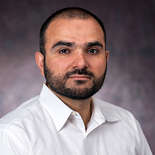Professor Mohseni has worked extensively in a number of divisions in the World Bank, including its treasury group, Middle East and North Africa (MENA) sustainable development group, and Development Economics (DEC) research group. Prior to his academic career, Professor Mohseni worked as a telecommunication engineer for Texas Instruments, Inc.
His research interests include development macroeconomics, economies of the MENA region, and Islamic finance. Professor Mohseni has taught courses in microeconomics, macroeconomics, history of economic thought, and development economics at both undergraduate and graduate levels. He will be teaching ECON-605 Introduction to Mathematical Analysis.
Get to know Amin and learn more about his experience.
AMIN MOHSENI-CHERAGLOU: Hello. My name is Amin Mohseni-Cheraglou. I'm an Assistant Professor of Economics at the Department of Economics here at American University. I hold a BS degree in Electrical Engineering from the University of Maryland, an MA degree from American University in International Development.
My research interest is development macroeconomics, with a focus on poverty, inequality, and growth from the perspective of macro policies, and also social economics. What excites me about this course is that this course is foundational for the MA program, for all other courses, and also any other graduate courses in Economics. What you're going to be learning in this class is going to be used over and over and over again in your research, and in your other courses. And if you decide to tap into other literature from other fields of inquiry, you can also find this material to be useful because, simply, they are tools that are used by everybody in all fields of science.
We are expecting for the students enrolling in this program to have a solid and working understanding of college level algebra II pre-calculus material. That's a minimum. And we'll be teaching them the calculus that they need to be able to succeed in this class. Like any other college courses, graduate college courses, we would expect the students to put about 15 hours a week learning the material, reading the book and the papers, and also doing the problem sets in order to be successful in this class.
This course is foundational for your future courses in this program, such as macroeconomic analysis and macroeconomic analysis and econometrics. Therefore, mastering the material in this course is going to help you to do well in your future courses as well. By taking this course, when you take the macroeconomic analysis, you'll be able to go through constraint optimization problems very easily.
In your macroeconomics course, comparative statics is the main concept that you will be using. And this course is going to provide you with the mathematical grounding to be able to go through those materials. In econometrics, the concept of matrix algebra is going to be used over and over again. And hopefully by the end of this course, you will have a solid understanding of how to manipulate matrices and how to talk with them.
Teaching a mathematically-oriented course in an online setting is not easy. In a traditional in-person setting, the professor would go on board, write the equations on the board, solve them, walk through them, and answer any questions that you students might have. In this class, we will also try to emulate that experience as much as possible.
In addition to being an assistant professor here at American University, I also do consulting work for the World Bank in Washington, DC. Therefore, I can bring my real world experiences from the World Bank and mix that with the material that I'm teaching in this class. Therefore, the material will not be only theoretical, but I will also mix in applied and pragmatic policy relevant issues into the course objectives.
When I'm not teaching, I'm not doing research, I like to spend time with my two little girls, one seven-year-old and one 15 months old. And in addition to that, I like reading about philosophy and world history. And I also like to hike and bike.
Learn more about our accomplished MA in Economics faculty members. Call 855-725-7614 to speak to one of our admissions representatives or request more information.




